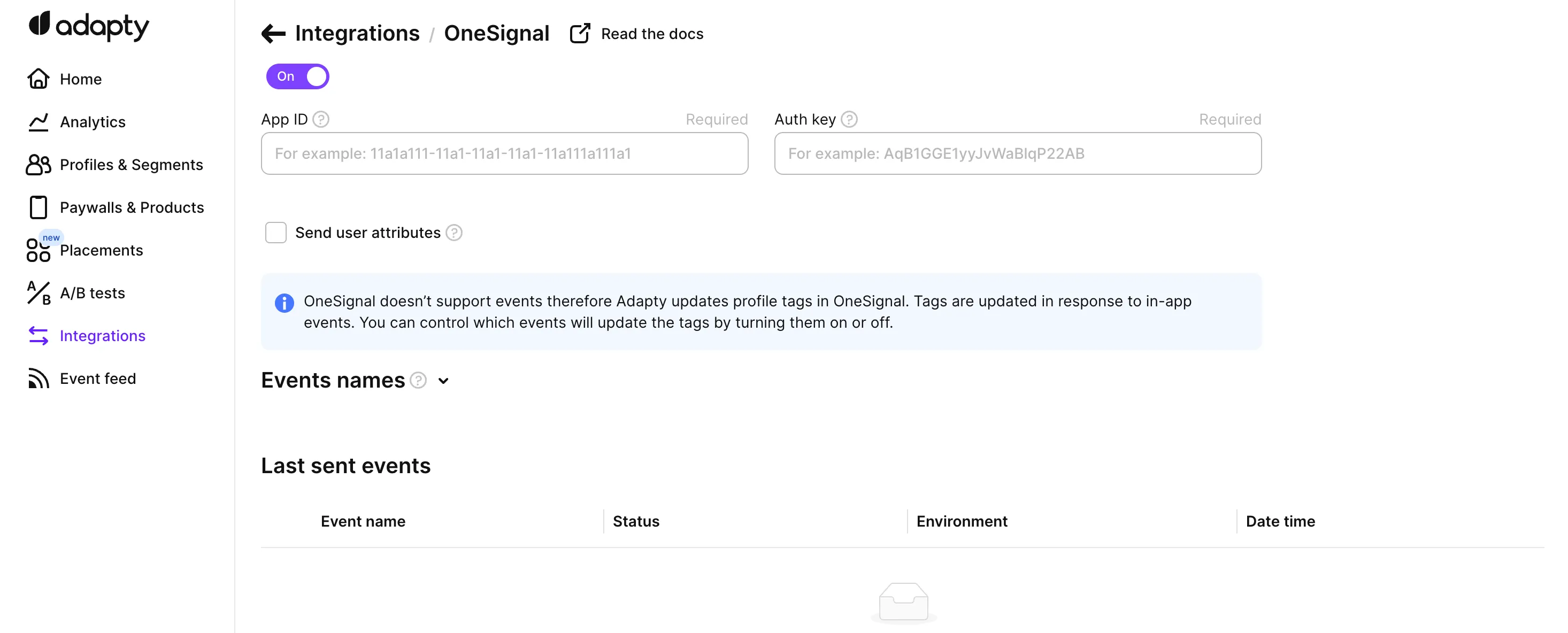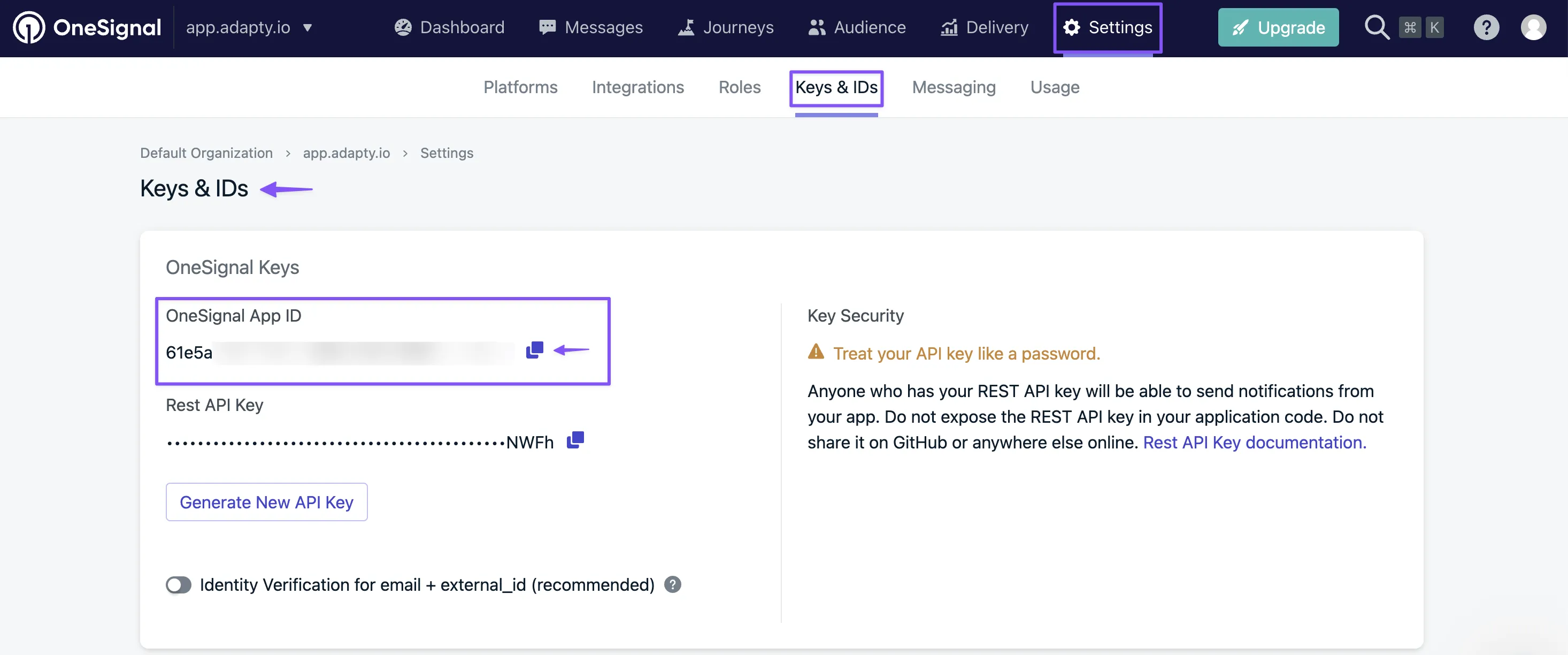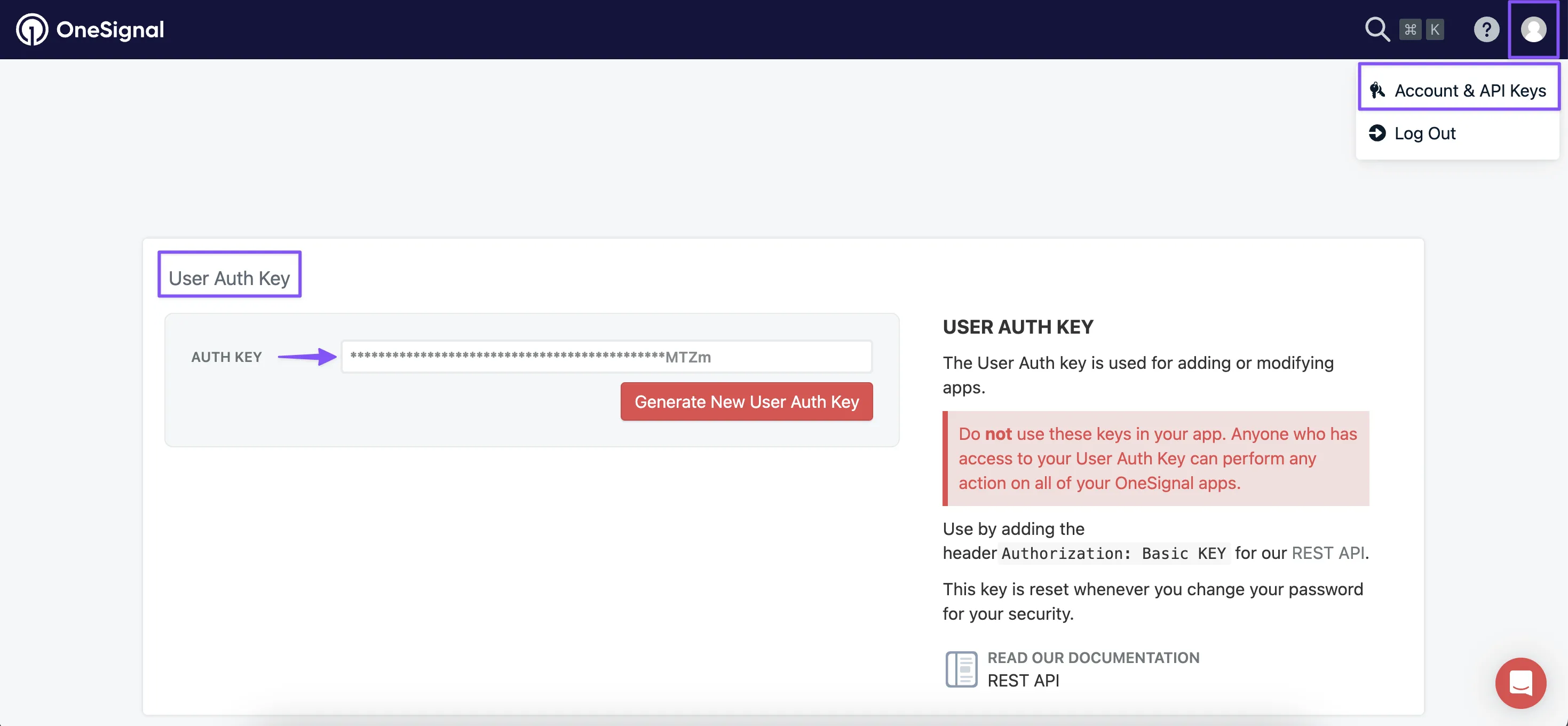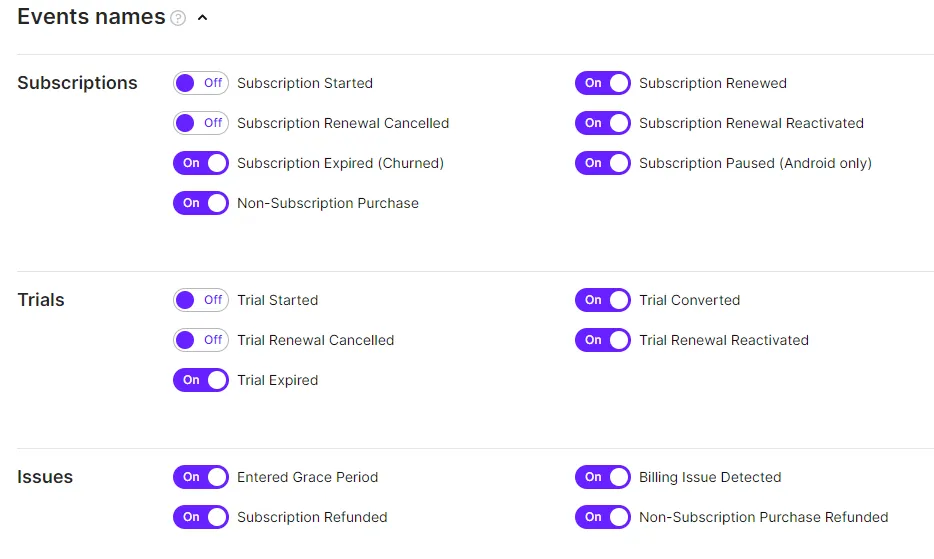OneSignal
As one of the top customer engagement solutions, OneSignal provides a wide range of tools for push notifications, email, SMS, and in-app messaging. By integrating Adapty with OneSignal, you can easily access all of your subscription events in one place, giving you the ability to trigger automated communication based on those events.
Adapty provides a complete set of data that lets you track subscription events from all stores in one place and can be used to update your OneSignal users. With Adapty, you can easily see how your subscribers are behaving, learn what they like, and use that information to communicate with them in a way that's targeted and effective. Therefore, this integration allows you to track subscription events in your OneSignal dashboard and map them with your acquisition campaigns.
Adapty uses subscription events to update OneSignal tags, so you can build target communication with customers using OneSignal push notifications after a short and easy integration setting as described below.
How to set up One Signal integration
To set up the integration with OneSignal, go to Integrations -> OneSignal in your Adapty dashboard, turn on a toggle from off to on, and fill out fields.
Set up credentials in the Adapty Dashboard
The initial step of the integration process is to provide the necessary credentials to establish a connection between your OneSignal and Adapty profiles.
You'll need to provide your OneSignal App ID and Auth Token. You can find more information about OneSignal Keys and IDs in following documentation.

Retrieving credentials from OneSignal dashboard
To find your OneSignal app ID and authentication key, simply navigate to your OneSignal dashboard.
Your App ID can be found under the **Keys & IDs **section in the Settings tab.

The Auth token can be found in the Account & API Keys section of your OneSignal dashboard.

After retrieving your OneSignal App ID and authentication key from the OneSignal dashboard, you need to add them to the Adapty dashboard in the corresponding fields.
Events and tags
Below the credentials, there are three groups of events you can send to OneSignal from Adapty. Simply turn on the ones you need. Check the full list of the events offered by Adapty here.

Adapty will send subscription events to OneSignal using a server-to-server integration, allowing you to view all subscription events in your OneSignal Dashboard and link them to your acquisition campaigns.
Please consider that starting from April 17th, 2023, it will not be possible to send attribution data from Adapty to OneSignal, if you are using the Free Plan of OneSignal. This integration is only available for OneSignal's Growth, Professional and higher plans. For more info please check OneSignal pricing.
Furthermore, it's important to note that the tag limitation applies to all the tags you have set up in OneSignal, including any existing tags. When sending data from Adapty to OneSignal, the tag limit in OneSignal includes both the tags sent from Adapty and the tags you may have already defined in OneSignal. Therefore, if you exceed the tag limit in OneSignal, it may result in errors when sending events from Adapty.
Custom tags
This integration can update and set various properties in your Adapty users as tags that will be send to OneSignal. You can refer to the list of tags provided below to determine which tag is best suited for your needs.
| Tag | Type | Description |
|---|---|---|
adapty_customer_user_id | String | Contains the value of the unique identifier of the user, which can be found from OneSignal side. |
adapty_profile_id | String | Contains the value of the unique identifier Adapty User Profile ID of the user, which can be found in your Adapty dashboard. |
environment | String | Indicates whether the user is operating in a sandbox or production environment. Values are either |
store | String | Contains the name of the Store that used to make the purchase. Possible values:
|
vendor_product_id | String | Contains the value of Product Id in Apple/Google store. e.g., org.locals.12345 |
subscription_expires_at | String | Contains the expiration date of the latest subscription. Value format is: year-month dayThour:minute:second e.g., 2023-02-10T17:22:03.000000+0000 |
last_event_type | String | Indicates the type of the last received event from the list of the standard Adapty events that you have enabled for the integration. |
purchase_date | String | Contains the date of the last transaction (original purchase or renewal). Value format is: year-month dayThour:minute:second e.g., 2023-02-10T17:22:03.000000+0000 |
active_subscription | String | The value will be set to true on any purchase/renewal event, or false if the subscription is expired. |
period_type | String | Indicates the latest period type for the purchase or renewal. Possible values are
|
Please consider that all float values will be rounded to int. Strings stay the same.
In addition to the pre-defined list of tags available, it is possible to send custom attributes using tags. This allows for more flexibility in the type of data that can be included with the tag and can be useful for tracking specific information related to a product or service. All custom user attributes are sent automatically to OneSignal if the user marks the ** Send User Attributes** checkbox from the integration page. When unchecked, Adapty sends exactly 10 tags. If the checkbox is checked, we can send more than 10 tags for greater flexibility in capturing relevant data.
SDK configuration
There are currently two ways to integrate OneSignal and Adapty: the old one, relying on playerId and the new one, relying on subscriptionId, since playerId is deprecated starting with OneSignal SDK v5
Make sure you send playerId (on OneSignal SDK pre-v5) or subscriptionId (on OneSignal SDK v5+) to Adapty, otherwise OneSignal tags couldn't be updated and the integration wouldn't work.
Here is how you can link Adapty with OneSignal with either playerId or subscriptionId:
- OneSignal SDK v5+ (current)
- OneSignal SDK v. up to 4.x (legacy)
- iOS (Swift)
- Android (Kotlin)
- (Android) Java
- Flutter (Dart)
- Unity (C#)
- React Native (TS)
// SubscriptionID
OneSignal.Notifications.requestPermission({ accepted in
Task {
try await Adapty.setIntegrationIdentifier(
key: "one_signal_subscription_id",
value: OneSignal.User.pushSubscription.id
)
}
}, fallbackToSettings: true)
// SubscriptionID
val oneSignalSubscriptionObserver = object: IPushSubscriptionObserver {
override fun onPushSubscriptionChange(state: PushSubscriptionChangedState) {
Adapty.setIntegrationIdentifier("one_signal_subscription_id", state.current.id) { error ->
if (error != null) {
// handle the error
}
}
}
}
// SubscriptionID
IPushSubscriptionObserver oneSignalSubscriptionObserver = state -> {
Adapty.setIntegrationIdentifier("one_signal_subscription_id", state.getCurrent().getId(), error -> {
if (error != null) {
// handle the error
}
});
};
OneSignal.shared.setSubscriptionObserver((changes) {
final playerId = changes.to.userId;
if (playerId != null) {
final builder =
AdaptyProfileParametersBuilder()
..setOneSignalPlayerId(playerId);
// ..setOneSignalSubscriptionId(playerId);
try {
Adapty().updateProfile(builder.build());
} on AdaptyError catch (adaptyError) {
// handle the error
} catch (e) {
// handle the error
}
}
});
using AdaptySDK;
using OneSignalSDK;
var pushUserId = OneSignal.Default.PushSubscriptionState.userId;
Adapty.SetIntegrationIdentifier(
"one_signal_player_id",
pushUserId,
(error) => {
// handle the error
});
import { adapty } from 'react-native-adapty';
import OneSignal from 'react-native-onesignal';
OneSignal.addSubscriptionObserver(event => {
const playerId = event.to.userId;
adapty.updateProfile({
oneSignalPlayerId: playerId,
});
});
- iOS (Swift)
- Android (Kotlin)
- Java
- Flutter (Dart)
- React Native (TS)
// PlayerID
// in your OSSubscriptionObserver implementation
func onOSSubscriptionChanged(_ stateChanges: OSSubscriptionStateChanges) {
if let playerId = stateChanges.to.userId {
Task {
try await Adapty.setIntegrationIdentifier(
key: "one_signal_player_id",
value: playerId
)
}
}
}
// PlayerID
val osSubscriptionObserver = OSSubscriptionObserver { stateChanges ->
stateChanges?.to?.userId?.let { playerId ->
Adapty.setIntegrationIdentifier("one_signal_player_id", playerId) { error ->
if (error != null) {
// handle the error
}
}
}
}
// PlayerID
OSSubscriptionObserver osSubscriptionObserver = stateChanges -> {
OSSubscriptionState to = stateChanges != null ? stateChanges.getTo() : null;
String playerId = to != null ? to.getUserId() : null;
if (playerId != null) {
Adapty.setIntegrationIdentifier("one_signal_player_id", playerId, error -> {
if (error != null) {
// handle the error
}
});
}
};
// PlayerID (pre-v5 OneSignal SDK)
// in your OSSubscriptionObserver implementation
func onOSSubscriptionChanged(_ stateChanges: OSSubscriptionStateChanges) {
if let playerId = stateChanges.to.userId {
Task {
try await Adapty.setIntegrationIdentifier(
key: "one_signal_player_id",
value: playerId
)
}
}
}
import { adapty } from 'react-native-adapty';
import OneSignal from 'react-native-onesignal';
OneSignal.addSubscriptionObserver(event => {
const playerId = event.to.userId;
adapty.updateProfile({
oneSignalPlayerId: playerId,
});
});
Read more about OSSubscriptionObserver in OneSignal documentation.
Dealing with multiple devices
One can often encounter the following situation: a single user has different devices and analytics of purchase events or user subscriptions becomes difficult. OneSignal suggests methods to cope with this problem. You can match different devices on your server side and send this information to OneSignal. Thus, when you change the user's tags, they will be updated not only for a specific device but for all devices the user has.
To take advantage of this feature, Adapty provides the ability to identify users using the Adapty SDK and send their ID to OneSignal. By leveraging this opportunity, you can easily match a user's devices and update tags for multiple devices without any extra actions. This not only simplifies the process of tracking user activity and subscriptions but also allows you to provide a seamless experience for your users across all their devices.
It's important to note that to properly match a user's devices, you must ensure that each user has a unique identifier. Adapty's customer_user_id can be used as an externalUserId for this purpose, but if your app doesn't have a registration system, you may need to use a different identifier. Additionally, it's crucial to keep this identifier consistent across all devices and to send updates to OneSignal whenever a user's ID changes. By keeping track of their activity and subscriptions across all devices, you can better understand their needs and provide them with relevant and timely notifications.